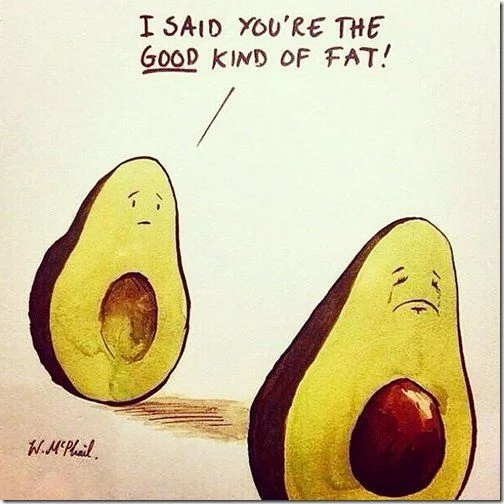During the 90s we saw a big push for low fat diets and low fat/reduced fat/no fat products. We began to see even more "diet foods" in the grocery isle - think Snackwell cookies etc. Fast forward 10 years later and incidents of heart disease and obesity have risen, which is the opposite of what we thought would happen. The issue with a low fat diet, besides the lack of your second most needed nutrient, is that most people will then consume more carbohydrates in order to remain full. There is also a greater likelihood that you will over eat foods with dietary fat due to biological and/or psychological cravings. Diet products low in fat also tend to have more sugar, salt, or chemically made dietary fats in order to compensate for taste.
Clearly there is more to this story. Many doctors and treatment recommendations have not caught up with the research, but we have discovered that reducing dietary fat in your diet will actual lead to your body storing more body fat. This all occurs due to the Ghrelin-Leptin hormone cycle, super science-y stuff that I will not go into.
Present day we are finally warming up to our friend dietary fat and thank goodness. Dietary fat is our second most needed nutrient (about 30% of our intake) and has super important roles in our diet and our body function.
- Chief storage form of energy
- Promotes healthy hair, skin, and nails
- Regulates mood, helps prevent depression
- Major source of energy
- Source of fat soluble vitamins
- Aids in absorption of fat soluble vitamins A, D, E, and K
- Acts as a cushion for vital organs
- Helps maintain body temperature
- Source of essential fatty acids needed for hormone production
- Adds flavor and taste to foods
- Slows digestion of food thus lending satiety to a meal
- Slowed digestion also helps in blood sugar regulation
Source of dietary fat - oils, butter, nuts, seeds, olives, bacon, mayonnaise, salad dressing, avocado, sour cream, cream cheese, nut butters, Nutella, and pesto.
If you are interested in learning more about this topic, visit my contact page to set up an appointment.
Dallas Nutritional Counseling - Dietary Fat Doesn't Make You Fat & Here is Why








LED Case Consultation - Ethics & Treatment of Longstanding Eating Disorders, Dallas Nutritional Counseling & Angela Harris Counseling professional consultation and supervision for severe and enduring eating disorders